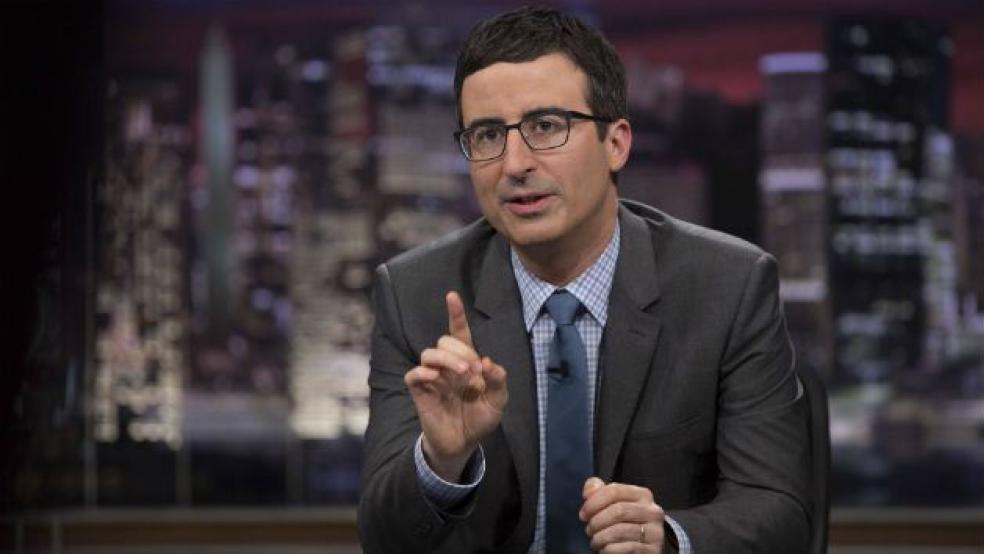When it comes to smart financial advice, comedian John Oliver seems to be on a roll.
Following up last week's medical debt investigation that went viral, "Last Week Tonight" turned its attention Sunday to retirement plans. With an estimated $24 trillion in retirement assets, Oliver said, 401(k) plans and other retirement accounts are a potential gold mine for financial services firms.
Related: 4 Essential Rules for Retiring Abroad
Oliver called out three problems in particular hurting consumers: Financial analysts that aren't required to work in clients' best interests, high fees that compound over time, and under performing actively managed funds.
"The entire retirement plan industry is a potential minefield," he said in the segment. "You need to pay attention."
Those are issues Oliver's team encountered personally. In setting up a 401(k) for show employees, he said, they realized their John Hancock-sponsored plan charged asset management fees of 1.69 percent, on top of a $24 per-person annual fee and other fund fees. An unnamed intermediary broker (who told Oliver's team he was not a fiduciary, i.e. required to work in their best interest) would receive 1 percent the first year and 0.50 percent thereafter.
Oliver said the show is covering the fees for its employees, and is also leaving both John Hancock and the broker.
Related: Retirement Incomes Falling Short in All but 3 States
In a statement provided to CNBC.com, John Hancock spokeswoman Melissa Berczuk said the firm stands by the value of the services it provides. "We feel that the analysis and presentation of fees and services by the show is flawed and misleading," she said.
"For the average person saving for retirement, it doesn't need to be this confusing," said Oliver in the segment.
Most retirement advice is common sense, said Oliver, segueing into a public-service video with comedian Billy Eichner and Broadway star Kristin Chenoweth. Here's what "Last Week Tonight" suggested, and our take on the advice.
1) Start saving now (and ideally, go back in time and start saving earlier).
Our take: Yes. The longer you wait, the less time you have for the magic of compounding to work for you – and the more you'll need to save. For example, a 25-year-old aiming to retire at 62 would need to set aside 15 percent to adequately replace his income in retirement, according to a 2014 study from the Center for Retirement Research at Boston College. If you start saving at age 35, you'd need to save 24 percent, while late starters at age 45 would need a whopping 44 percent.
Related: The Retirement Revolution That Failed: Why the 401(k) Isn’t Working
2) Keep the money in low-cost index funds. "Check it about as often as you Google whether Gene Hackman is still alive," said Eichner.
Our take: This is a smart bet for most consumers. Numerous studies have found that actively managed funds typically fail to outperform index strategies that track a market benchmark such as the S&P 500 index, and they have lower costs, to boot. A 2015 study from SigFig found that the wealthiest investors tend to focus on low-fee investments, abstained from panic selling and seemed to trade less often – behaviors that helped them achieve significantly better investment returns.
3) Ask if your advisor is a fiduciary. If they aren't? Find a new pro to work with.
Our take: Yes, but that's just one of the questions you should be asking ahead of the April 2017 implementation of the broader fiduciary standard rule. Some investment products may be subject to other rules, and you should ask how a broker or advisor handles such recommendations.
4) Gradually shift from stocks to bonds as you get older.
Our take: Yes – but there's some nuance in how gradually. Entering retirement with a portfolio that's heavy on stock can be risky. A 2015 Prudential report found that negative net returns shortly after retirement can be more damaging than bad years later in retirement. But Americans are living longer, which might mean you'll spend 25 to 30 or more years in retirement. Enter retirement with a portfolio that's too conservative, and it won't generate enough growth to help you balance out distributions.
5) Keep fees, Eichner said, "like your milk – under 1 percent."
Our take: Yes, yes, yes. As the segment put it, "Even one tenth of one percent can really f--- you." A 2014 Center for American Progress report estimated over a career, high fees could cost you a six-figure sum and shave off 20 percent or more off your savings balance. Check BrightScope.com to see how your plan's fees stack up , and if the results are bad, consider saving outside your workplace plan.
This article originally appeared on CNBC. Read more from CNBC:
Trump: If elected, I'll ban immigration from areas with terrorism ties
Polls say Brexit is likely, but the betting markets say it isn't




